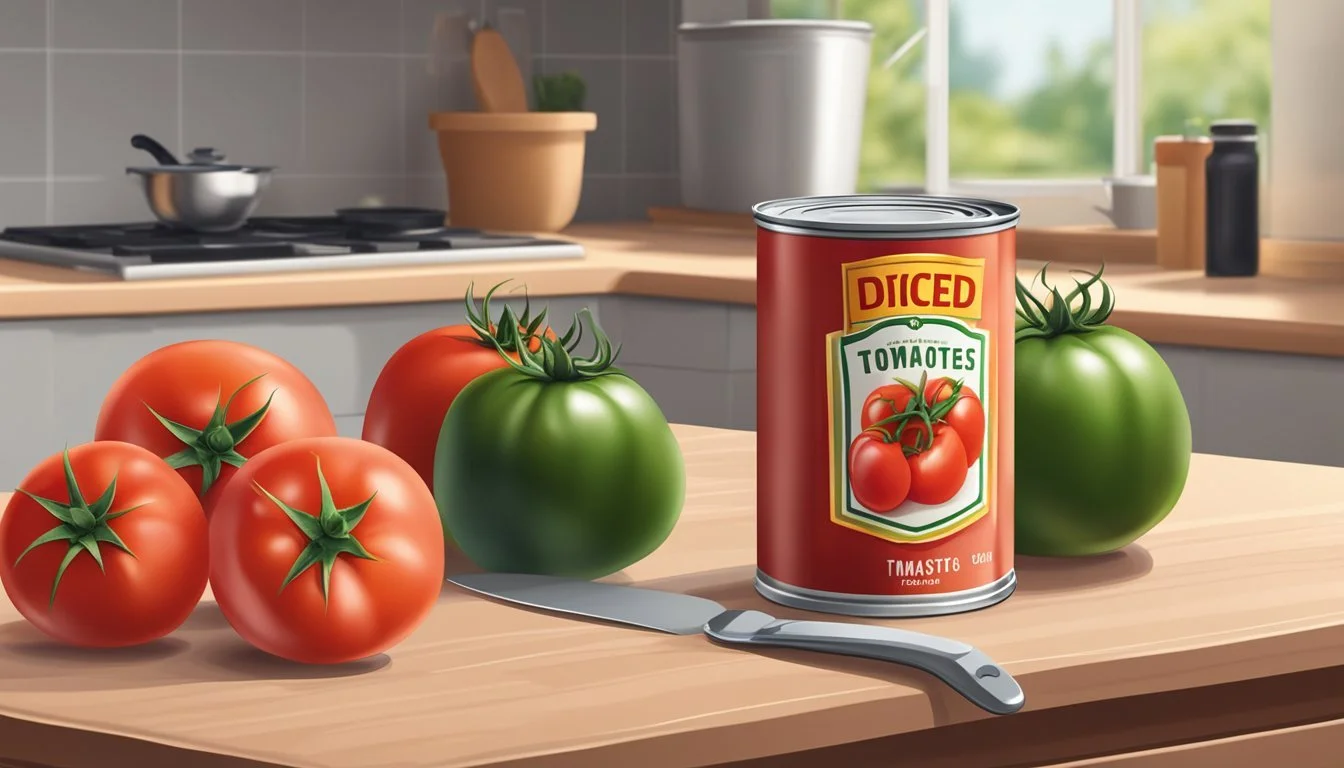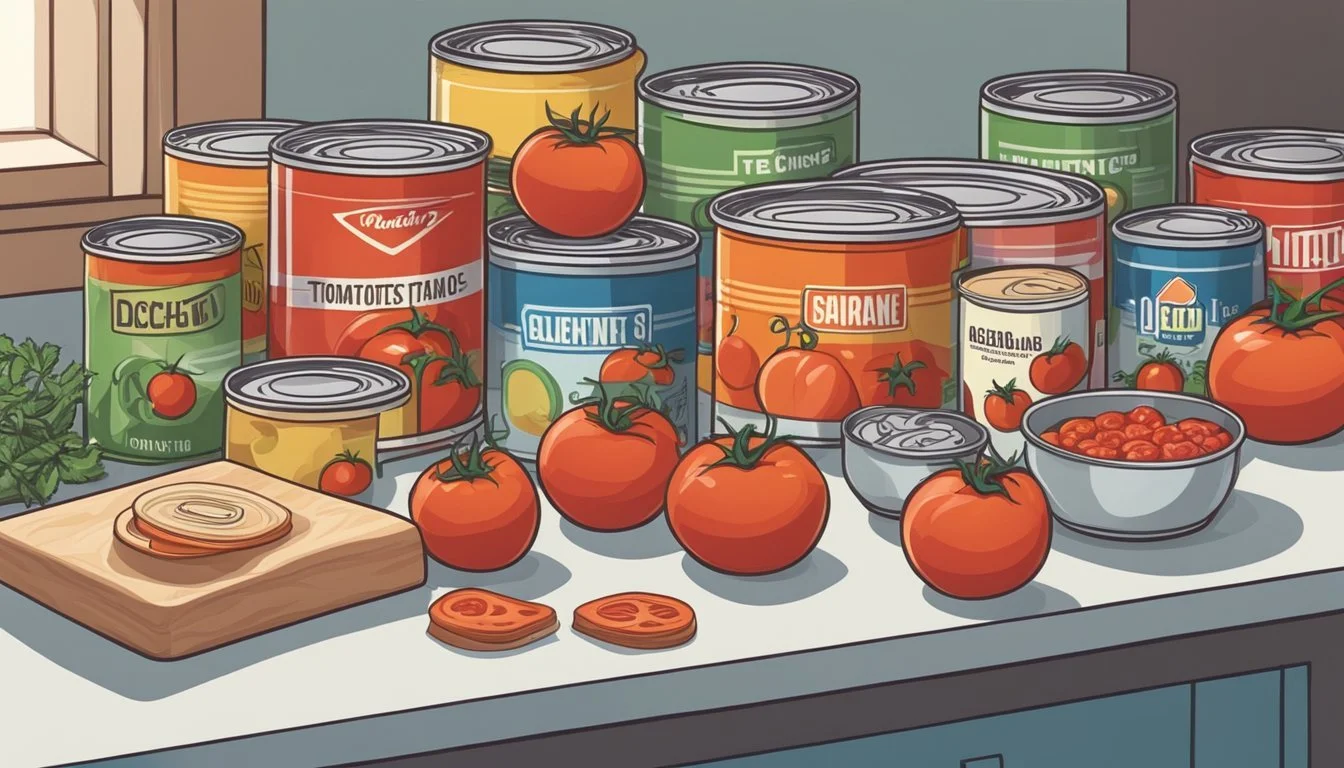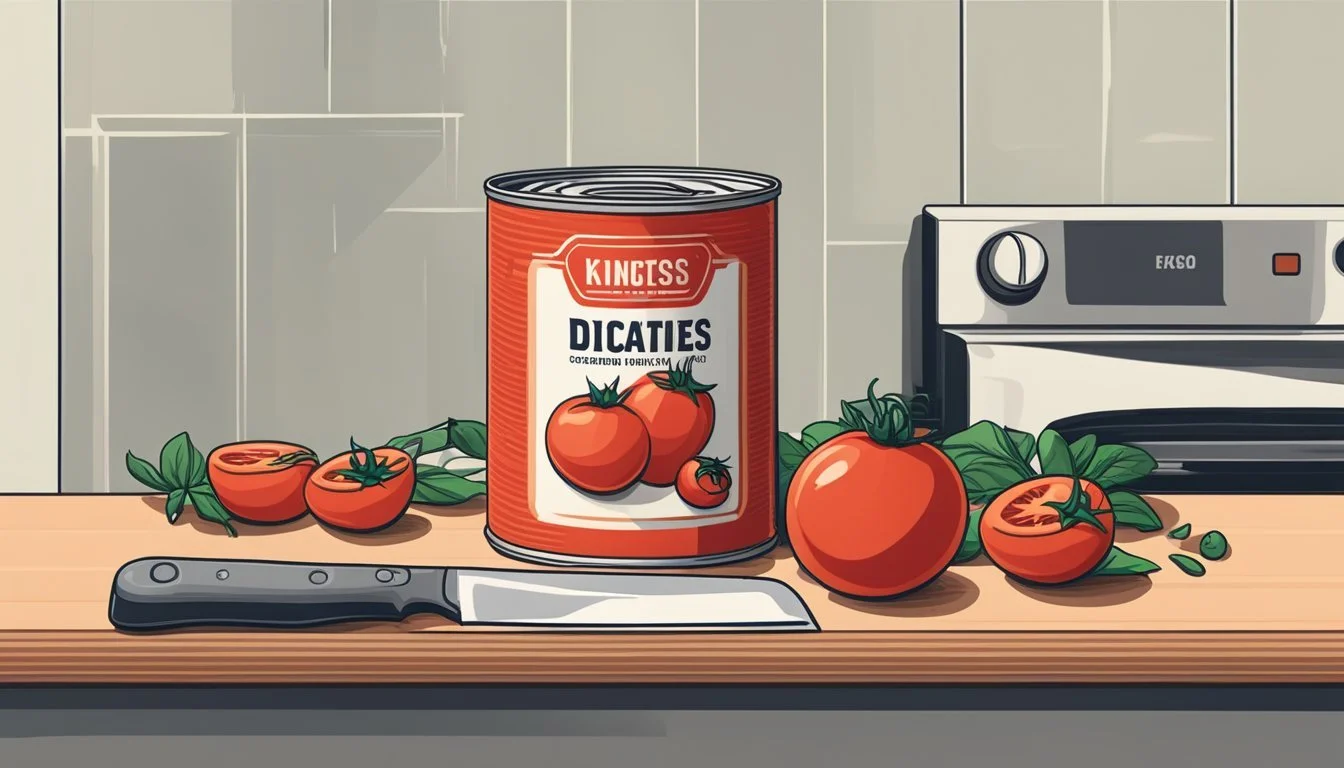Diced Tomatoes Substitutes
Best Alternatives for Your Recipe
Replacing diced tomatoes in a recipe can be a necessity, whether due to dietary restrictions, running out of supplies, or simply seeking a new flavor profile. Tomato paste serves as an excellent substitute due to its concentrated tomato flavor and versatility in many dishes. It can be mixed with water or stock to achieve a consistency similar to diced tomatoes.
For those looking for fresh alternatives, whole peeled tomatoes can be easily chopped to mimic diced tomatoes. Fresh tomatoes also add a vibrant and healthy component to your recipes, maintaining that authentic tomato flavor. Additionally, crushed tomatoes and tomato puree offer a smooth texture while retaining the rich, robust taste essential for soups, stews, and pasta sauces.
Finally, tomato juice and tomato soup are handy if you're in a pinch. They may slightly alter the texture but still deliver the essential tomato essence. Exploring these substitutes ensures your dish remains flavorful and delicious, even without the exact ingredient.
Understanding Diced Tomatoes
Diced tomatoes are small chunks of tomatoes often found in canned form at supermarkets. They are used extensively in a variety of recipes due to their distinct texture and flavor. This section delves into their key characteristics, common culinary uses, and health benefits.
Key Characteristics of Diced Tomatoes
Diced tomatoes are cut into small, uniform pieces that retain a firm texture. They are typically preserved in tomato juice or puree, which helps maintain their flavor and texture. Unlike crushed tomatoes, which are more fluid, diced tomatoes provide a chunkier consistency in dishes.
The flavor of diced tomatoes is a balance of sweetness and acidity, making them versatile in cooking. They come in various types, including plain, fire-roasted, and those enriched with herbs and spices, catering to different culinary needs.
Culinary Uses for Diced Tomatoes
Diced tomatoes are a staple in many recipes due to their convenience and flavor. They are commonly used in soups, stews, and salsas. Their firm texture holds up well during cooking, making them ideal for slow-cooked dishes.
In pasta sauces and pizza sauces, diced tomatoes offer a robust tomato flavor that complements other ingredients. They are also used in salads and salsas, providing a fresh taste and a pleasant textural contrast. Many home cooks prefer canned diced tomatoes for their consistency and year-round availability.
Health Benefits of Tomatoes
Tomatoes are highly nutritious and beneficial for health. They are low in calories but rich in essential nutrients like vitamins C and K, minerals like potassium, and antioxidants like lycopene, which is linked to reduced risk of heart disease and cancer.
Regular consumption of tomatoes supports overall health by providing nutrients that help maintain skin health, boost the immune system, and support heart health. Their high water content also makes them a hydrating component of a balanced diet.
Choosing Tomato Substitutes
When choosing substitutes for diced tomatoes, it is essential to consider how factors like flavor, texture, and cooking time affect the final dish. Different dishes may benefit from specific substitutes to achieve the desired outcome.
Factors to Consider
When selecting a tomato substitute, several factors need to be taken into account: flavor, texture, and acidity.
Flavor can vary widely among substitutes. For instance, tomato paste offers intense, concentrated tomato flavor, while fresh tomatoes provide a lighter, more delicate taste.
Texture is also crucial. Crushed tomatoes or tomato puree deliver a smoother consistency, suitable for soups and sauces, whereas whole peeled tomatoes can be chopped for a chunkier texture.
Lastly, consider the acidity and sweetness. Items like sun-dried tomatoes introduce more sweetness, while tomato sauce maintains a balanced acidity. Matching these characteristics to the original recipe helps in achieving the desired flavor profile.
Substitute Options by Dish Type
Different dishes call for different tomato substitutes to ensure the best results.
Soups and Stews: For these, crushed tomatoes or stewed tomatoes work well due to their texture and ability to blend seamlessly. Tomato juice can also be used for a thinner consistency.
Dish Type Best Substitutes Soups and Stews Crushed tomatoes, stewed tomatoes, tomato juice
Pasta Dishes: When making pasta sauces, consider using whole canned tomatoes or tomato passata. These provide the necessary consistency and flavor depth. Fresh tomatoes, when in season, are a great option too.
Curries: In curries, tomato puree or whole canned tomatoes help to build a smooth and rich base. Sometimes, tomato paste can be used for an enriched flavor.
Dish Type Best Substitutes Pasta Whole canned tomatoes, tomato passata Curries Tomato puree, whole canned tomatoes, tomato paste
By choosing the right substitute based on these considerations, one can maintain the integrity and deliciousness of their dishes without the need for diced tomatoes.
Fresh Tomato-Based Substitutes
When fresh tomatoes are unavailable, there are multiple alternatives that can closely replicate their flavor and texture, ensuring your dishes remain tasty and vibrant.
Fresh Tomatoes
Chopped fresh tomatoes are a versatile substitute for diced tomatoes. They retain a similar flavor and texture, providing a fresh, juicy addition to soups, stews, and sauces. To substitute, use an equal quantity of chopped fresh tomatoes.
For recipes needing a saucier consistency, simmer the chopped tomatoes to release their juices. This method helps in achieving the desired consistency without compromising on flavor.
Fresh tomatoes excel in dishes that highlight raw or lightly cooked tomatoes, such as salads, salsas, or pasta sauces.
Whole Peeled Tomatoes
Whole peeled tomatoes, commonly sold canned, are another excellent substitute. These tomatoes are preserved whole, usually in tomato juice or puree, retaining much of their original flavor and texture.
To use as a substitute, simply chop the whole peeled tomatoes to achieve the desired chunkiness similar to diced tomatoes. This option works well in dishes like stews, casseroles, and sauces where some cooking and breaking down of the tomatoes is required.
Adjust the overall liquid content in your recipe as these tomatoes come with additional juice. It ensures your dish does not become too watery.
Sun-Dried Tomatoes
Sun-dried tomatoes offer a more intense flavor, making them a unique alternative. They are tomatoes that have been dried to remove most of their moisture, concentrating their flavor and sweetness. Sun-dried tomatoes can be packed dry or in oil.
When using sun-dried tomatoes as a substitute, they can be chopped finely and rehydrated in hot water or broth to soften them. This substitute is best for recipes where a deeper, more robust tomato flavor is desired, such as in pasta dishes, savory sauces, or Mediterranean-inspired recipes.
The texture difference is more pronounced with sun-dried tomatoes, as they add a chewier element to the dish, enhancing its overall complexity.
Canned Tomato-Based Substitutes
When you need a substitute for diced tomatoes, canned tomato products like crushed tomatoes, tomato puree, and tomato sauce can be excellent alternatives. Each offers distinct textures and flavors suitable for different recipes.
Crushed Tomatoes
Crushed tomatoes are a versatile option that often come in cans. They consist of tomatoes crushed to a pulp, yielding a semi-chunky texture that retains some pieces of tomato flesh. This makes them ideal for recipes requiring a thicker consistency, such as soups and stews.
The flavor of canned crushed tomatoes is rich and robust, closely mimicking the taste of fresh diced tomatoes. They blend well in sauces and are less watery than whole canned tomatoes. When using crushed tomatoes as a substitute, consider adding them to dishes like pasta sauces or chili for a hearty and flavorful result.
Tomato Puree
Tomato puree offers a smooth consistency and is essentially tomatoes that have been cooked briefly and then strained to remove seeds and skin. This product is excellent for achieving a uniform texture in your recipes, making it an ideal choice for creamy soups and smooth sauces.
Canned tomato puree has a concentrated tomato flavor, which can enhance dishes like marinara or pizza sauce. It’s thicker than tomato juice but not as dense as tomato paste. Mixing it with some water can help achieve the desired consistency for recipes originally calling for diced tomatoes.
Tomato Sauce
Tomato sauce is another canned tomato product that serves as a good substitute for diced tomatoes. It is made by cooking tomatoes down to a sauce consistency, often with added seasonings like garlic, onion, and herbs.
The flavor of canned tomato sauce is enhanced by these seasonings, making it suitable for dishes needing a quick, flavorful base. It’s thinner than puree and has a smoother texture without the chunks found in diced or crushed tomatoes. Use it in recipes for pasta sauces, casseroles, or as a base for stews where a smooth, seasoned tomato flavor is beneficial.
Other Substitutes
For those times when diced tomatoes are unavailable, several other tomato products can step in effectively. Each substitute brings its own unique features in terms of texture, flavor, and cooking application.
Tomato Paste
Tomato paste is a concentrated product that offers a rich tomato flavor. It's made by cooking tomatoes for a long duration, which reduces their water content and concentrates their taste. This paste works well in dishes where you need an intense tomato taste but don't mind a smoother, thicker texture.
When substituting for diced tomatoes, use 1 to 2 tablespoons of tomato paste per 14.5 oz can of diced tomatoes. To achieve a consistency closer to diced tomatoes, dilute the paste in 1 cup of water or stock. This helps in evenly distributing the flavor throughout your dish.
Pro Tip: Store leftover tomato paste in the freezer by scooping it into tablespoon-sized portions. This ensures it stays fresh and ready for future use.
Tomato Juice
Tomato juice serves as another viable alternative, especially for liquid-based recipes like soups and stews. It offers a milder flavor and a thinner consistency compared to diced tomatoes. Tomato juice can seamlessly blend into dishes, providing both the liquid content and essential tomato taste.
Use a 1:1 ratio when replacing diced tomatoes with tomato juice. For instance, if a recipe calls for one cup of diced tomatoes, use one cup of tomato juice instead. This substitute works best when added at the same stage in the cooking process as the original ingredient to maximize flavor absorption.
Essential Note: Blending the tomato juice before adding it to your recipe can help achieve a smoother consistency, if desired.
Passata
Passata is a smooth, sieved tomato purée that offers a fresh tomato flavor without seeds or skins. It provides a consistency that is denser than tomato juice but not as thick as tomato paste. This makes it an excellent choice for sauces, soups, and stews where a smooth texture is preferred.
Use passata in equal quantities as diced tomatoes. It’s particularly useful in recipes that benefit from an even consistency, like a delicate tomato soup or a refined pasta sauce. The preparation time remains virtually the same as it integrates quickly into most recipes due to its smooth texture.
Flavor Profile: Passata delivers a fresh and pure tomato taste, ideal for dishes that highlight the natural flavor of tomatoes.
Non-Tomato Substitutes
When diced tomatoes are not an option, various non-tomato substitutes can fill the gap by offering similar textures and flavors. These alternatives include vegetables and certain condiments and sauces.
Vegetables as Alternatives
Red Bell Peppers: Fresh red bell peppers make an excellent substitute for diced tomatoes. They provide a sweet, slightly tangy flavor and vibrant color. Chop them to mimic the size and texture of diced tomatoes. Red bell peppers work well in soups, stews, and sauces.
Carrots: For a subtle sweetness, finely diced carrots can replace diced tomatoes. This alternative is suitable for dishes where a bit of sweetness is welcome. Carrots maintain their shape when cooked, making them perfect for stews and stir-fries.
Beans: While not a vegetable, beans like chickpeas or black beans can also serve as a substitute. They offer a different texture but add a hearty element to dishes like chili, salads, and casseroles. Beans work well where a more substantial bite is needed.
Using Condiments and Sauces
Salsa: Pre-made salsa can be a convenient substitute for diced tomatoes. It offers a mix of vegetables and spices, providing a flavor punch. Choose a salsa with a consistency and spiciness that matches your dish. Salsa is ideal for tacos, burritos, and even scrambled eggs.
Pizza Sauce: Pizza sauce can be used in place of diced tomatoes, especially in pasta and pizza recipes. It usually contains herbs and spices, adding depth of flavor. Ensure the sauce is not too thick or thin for your recipe.
Vegetable-based Sauces: Sauces made from roasted red peppers or other vegetables can also substitute diced tomatoes. These sauces provide a smooth texture and nuanced flavors, suitable for pasta dishes, dips, and spreads. Look for varieties that complement the dish you're preparing.
Preparation and Storage Tips
Fresh diced tomatoes offer a robust flavor and firm texture. To prepare, wash the tomatoes, remove the cores, and dice evenly. San Marzano tomatoes, known for their sweet flavor and low acidity, make an exceptional choice. Regularly used in Italian recipes, these tomatoes enhance the dish's overall taste.
Canned tomatoes provide convenience and consistency. They often include additives like calcium chloride to retain firmness. Before use, rinse the canned tomatoes to remove excess sodium. It's important to note that whole peeled tomatoes can be diced if canned diced tomatoes aren't available.
Storage Tips:
Fresh Diced Tomatoes:
Store in an airtight container.
Keep refrigerated for up to 3 days.
For longer storage, freeze them spread out on a baking sheet, then transfer to a freezer bag.
Canned Tomatoes:
Unopened cans can be stored in a cool, dry place.
Once opened, transfer any unused tomatoes to a lidded container.
Refrigerate for up to 5-7 days.
Keep in mind that freezing can slightly alter the texture, making the tomatoes softer. This works well for soups and stews but may not be ideal for dishes requiring a firmer bite.







